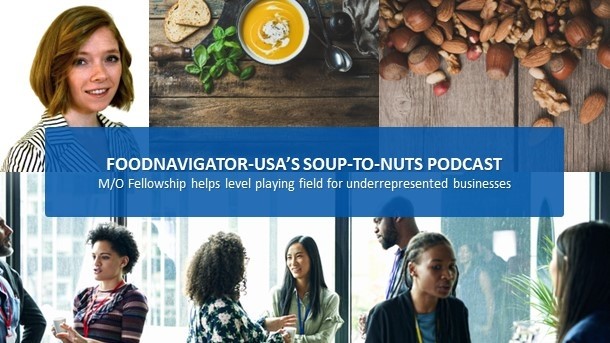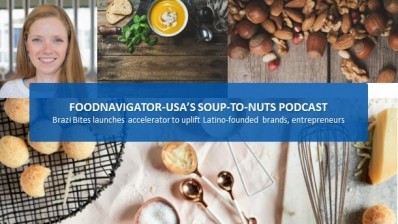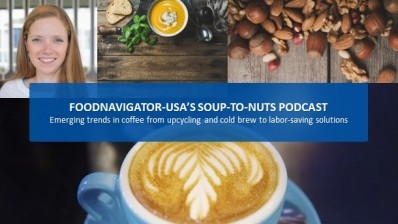Soup-To-Nuts Podcast: M/O Fellowship helps level playing field for underrepresented businesses

According to data from NiesenIQ, the top social issues driving purchase decisions are racial injustice and equality, and according to CrunchBase, 25% of consumers intentionally shop minority-owned brands – a figure that goes up to 42% for Black consumers, 36% for Latinx shoppers and 32% of Asian buyers.
Despite this demand, CrunchBase found 77.1% of venture capital-backed founders are non-minority, and Census Bureau data reveals Black businesses make up only 2.2% of the 5.7 million US businesses with employees even though they make up 14.2% of the US population. The reasons for the discrepancy are myriad, but they do not include a lack of ambition, determination, innovation or the appetite for risk that predict successful entrepreneurs, according to analysis by Gallup that found no statistical differences between Latino, Hispanic, Black and white people.
Rather, visible and invisible barriers holding back underrepresented founders include a lack of cumulative community or multigenerational wealth and guidance from which to draw, higher loan denial and interest rates, different cultural expectations and obligations, and even a different set of vocabulary for how they talk about their goals and achievements.
To help level the playing field for underrepresented founders in the natural and organic ecosystem and close the gap between what consumers say they want and what they can access, the industry group Naturally Network and the market research firm NielsenIQ have joined forces to launch nationally a fellowship to support minority-owned companies.
In this episode of FoodNavigator-USA’s Soup-To-Nuts Podcast, Naturally Network executive director Katrina Tolentino shares details about the 12-week long Minority-owned, or M/O, Fellowship designed to support racially and ethnically underrepresented entrepreneurs in the organic and natural sector. She also explores why this – and programs like it – are essential and lessons learned for becoming a better ally for underrepresented entrepreneurs.
[Editor’s Note: Never miss an episode of FoodNavigator-USA’s Soup-To-Nuts podcast – subscribe today.]
Connecting with underrepresented businesses
While underrepresented entrepreneurs may not currently have the same amount of mainstream shelf space, flock to leading tradeshows or make up the same proportion of presenters at pitch slams or investor events as their white counterparts – they are out there and just as innovative and capable and in need of support.
When Tolentino said she first began working on the M/O Fellowship pilot program qualified applicants flooded in – prompting comments by some that they didn’t know that many founders of color were in the CPG space.
“I found that statement a little bit shocking. And what I realized is that because they’re not visible in the community, it isn’t that they don’t exist. They are absolutely there. But they are not using the industry language. They’re not attending industry events. They’re not plugging into the resources that are already out there necessarily. And so people may not necessarily see that there are founders of color that are in the consumer packaged goods industry.”
This is something she wants to change by working with NielsenIQ to launch nationally the M/O Fellowship, which is a 12-week, virtual program in which participants have weekly online classes on business foundations, bi-monthly facilitated fireside chats and networking opportunities with industry leaders and founders. Each participant also will be paired with another fellow in the cohort for support and an advisor with whom they will be meet bi-monthly for insights and feedback.
“We are looking for 51% minority owned companies that have been in business for under five years, are making at least $5,000 in the previous 12 months and ready and able to invest 10 hours a month to participate in the education and the networking opportunities,” Tolentino said.
“Now the reason we are intentionally starting our revenue requirement that low is that this is an opportunity to provide and grow the diversity … pipeline for CPG entrepreneurship. There are not a lot of resources for founders at this stage,” and we think we can help them grow by pointing to them the different types of resources and opportunities available, she said.
M/O Fellowship’s successful start
The idea for the national M/O Fellowship grew out of a pilot program run by Naturally Network affiliate Naturally Austin in partnership with the CPG-focused accelerator SKU, which in its first round in 2021 served more than 70 minority-owned brands – all of whom reported feeling more confident navigating resources and opportunities following the program.
In addition, 90% reported that it exceeded their expectations, 90% also said they benefited from connecting with other diverse founders and the curriculum that included networking, education and mentorship, and 10 were accepted to and completed the M/O Track by SKU and received grant dollars.
Listen and learn
A key component of most fellowship programs or accelerators is pairing participants with established industry players who can help them navigate the landscape and from whom they can listen and learn.
But one aspect that makes the M/O Fellowship stand out is it is not just the participants who are expected to listen and learn – it is also the mentors and the program coordinators – creating a two-way dialogue that Tolentino says not only makes the fellowship better but cultivates better allies for underrepresented founders.
As such, even though 90% of the mentors who participated in the first round of the M/O Fellowship said the program met or exceeded their expectations, Tolentino said for the second cohort in Austin the fellowship ditched the mentors in favor of advisors.
This may sound like a subtle shift but Tolentino explained it altered the expectations of those providing guidance and better prepared them to learn from be allies for founders of color. She explained that the term advisor suggested more of a coaching and resource facilitation role that balanced being “part therapist and part business feedback.”
The fellowship also helps advisors set realistic expectations about what resources participants have available and where they are in their education.
Flexibility is essential to overcome visible and invisible barriers
One of the most moving lessons Tolentino said she learned from the first cohort was the importance of meeting participants where they are, understanding their operating parameters and acknowledging that their participation is only one of many obligations they must juggle.
For example, she said, an M/O fellow in Austin last year had previously applied to an accelerator program but told she was as “committed” as they would like because she also needed to work full time to fun her business as it scaled.
“That kind of feedback is really hurtful for founders of color. And so, I think, what I would like to push … as part of having a program like this is that we really should be acknowledging what those invisible barriers might be,” she said.
Other invisible barriers might be if an founder is an immigrant comes from a culture that doesn’t prize or even actively discourages entrepreneurship, which means they are not getting the emotional support others might have.
In addition, she said, programs aimed at helping founders of color should have people of color in leadership roles so that participants feel welcome and see themselves in those with whom they are working.
With this in mind, Tolentino explained that Naturally Network opted to keep the program virtual so that participants had more flexibility to balance what they want to do with what they need to do.
Tapping into the established mainstream network isn’t enough
Another lesson learned that Tolentino said could help boost the effectiveness of other programs aimed at lifting up underrepresented founders is that it isn’t enough to simply share the opportunity across the host’s existing network – active outreach is essential.
“We have to go to where the founders are right now. When we are publicizing programs like this that support founders of color are we actually to where they are? Or are we just posting on social media? Are with just asking our existing network to help promote it? We’re not going to reach the people that we need to reach if that is the case,” she said.
For M/O Accelerator she said they reached out to small business incubators, different chambers of commerce that cater towards founders of color and tried to build a community of partnerships to support getting the world out about the program.
Diverse businesses can help build a more diverse consumer base
Cultivating more diversity among entrepreneurs doesn’t just help individual businesses get off the ground – it helps the entire industry better meet the needs of consumers, which in turn can cultivate loyalty, generate higher sales across the board and create industry-level opportunities.
“We have an opportunity to meet the needs of the future consumer. Younger Millennials, Gen Z are more adventurous when it comes to flavor and founders of color oftentimes are wanting to bring in these more nostalgic flavors they grew up with,” Tolentino said.
She added that for Black consumers, NielsenIQ data shows the top social issues driving purchase decisions are racial injustice, equity and hunger, while among Hispanic consumers it is hunger and food insecurity as well as equality. Likewise, Asian American consumers buy products by as equality.
“As an industry, we need to meet that, and there are a lot of opportunities here to do that .. .by helping diverse founders get to shelf,” she said.
Small business owners interested in learning more about the M/O Fellowship can join a webinar Aug. 9 ore learn more at naturallynetwork.org/mo-fellows. The deadline for apply is Aug. 31 and the cohort will be selected Sept. 16 for an Oct. 4 onboarding.










